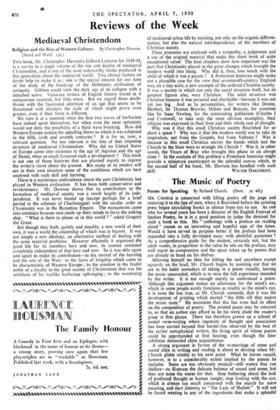Reviews of the Week
Mediaeval Christendom
Religion and the Rise of Western Culture. By Christopher Dawson. (Sheed and Ward. is.)
THIS book, Mr. Christopher Dawson's Gifford Lectures for 1948-49, Christendom, and is one of the most noteworthy books produced in is a survey in a single volume of the rise and decline of mediaeval this generation about the mediaeval world. Two chance factors no doubt help to make it so ; one is the special interest for our time of the study of the break-up of the Hellenistic civilisation of antiquity. Gibbon could view the dark age of its collapse with a detached scorn. Victorian writers of English history found in it antiquarian material, but little more. But we regard those death- throes with the fascinated attention of an age that seems to be threatened with disasters the scale of which might prove even greater, even if their form is different.
We view it at a moment when the first two waves of barbarism have indeed spent themselves, but when even the most optimistic would not deny the possibility of a third wave breaking. How did Western Europe sustain the appalling blows to which it was subjected in the fifth, sixth and seventh centuries ? It is for us, now, a relevant question. No less relevant is the fate of that imposing structure of mediaeval Christendom. Why did no United States of Europe come into existence in the age of Aquinas and the age of Dante, when so much favoured such a development,? This book is not one of those histories that are planned mainly to express the writer's views about the present. But many of its readers will see in their own situation some of the conditions which are here analysed with such skill and learning.
There is a mysterious ambivalence about the part Christianity has played in Western civilisation. It has been both conservative and revolutionary. Mr. Dawson shows that its contribution to the formation of mediaeval society was a result largely of its inde- pendence. It was never bound up (except perhaps for a brief period in the schemes of Charlemagne) with the secular order as Christianity was in the Byzantine Empire. The monasteries came into existence because men made up their minds to leave the sinking ship. "What is there to please us in this world ? " asked Gregory the Great.
But though they built, quietly and steadily, a new world of their own, it was a world the citizenship of which was in heaven. It was not simply a new ideology, an alternative method of dealing with the same material problems. However efficiently it organised the good life for its members here and now, its essence remained completely independent of that here and now. So it was able again and again to make its contribution—to the revival of the learning and the arts of the West ; to the form of kingship which came to be characteristic of Western Europe; to the creation in the feudal noble of a loyalty to the great society of Christendom that was the antithesis of his warlike barbarian upbringing ; to the sweetening of mediaeval urban life by insisting, not only on the organic differen- tiation, but also the natural interdependence, of the members of Christian society.
These processes are analysed with a sympathy, a judgement and a use of the original material that make this short book of quite exceptional value:' The final chapters show how important was the part that Christianity played in the great changes which brought the modern world into being. Why did it, then, lose touch with the child of which it was a parent ? A Protestant historian might make out a plausible case for the view that seventeenth-century England was, on a tiny scale, a new example of the ordered Christian society. It was a society in which not only the social structure itself, but its greatest figures also, were Christian. The solid structure was Christian because it was personal and charitable—because it was not yet too big. And as to personalities, for writers like Donne, Herbert, Sir Thomas- Browne, Milton and Bunyan, for scientists like Sir Isaac Newton, for the outstanding politicians (Charles I and Cromwell, to take only the most obvious examples), their religion was expressed in their lives and their whole cast of thought.
Why was it that this small Christian society flourished for so short a space ? Why was it that the modern world was to take its inspiration, not from the Gbspels, but from Voltaire ? Was it because in this small Christian society the bonds which tied the Church to the State were to strangle the Church ? Was it, in other words, the Vicars of Bray who brought this phase to an abrupt close ? In the analysis of this problem a Protestant historian might provide a miniature counterpart to the splendid canvas which, in the second half of his book, Mr. Dawson. has handled with such






































 Previous page
Previous page